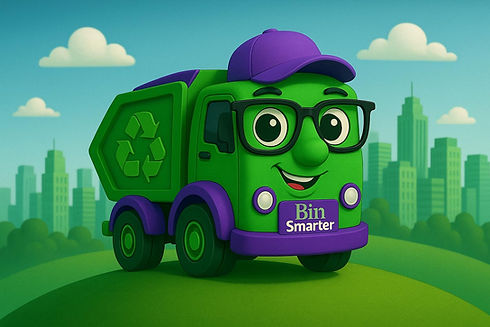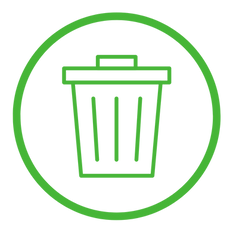
Binology – The Smart Waste and Recycling Guide for Businesses
Welcome to Binology – The Smart Waste and Recycling Guide for Businesses
Sort your waste correctly. Reduce contamination. Improve recycling across your business.
At Bin Smarter, we understand that effective waste management is vital for every businesses. Binology is your central resource for understanding what goes in each bin, how to avoid contamination and how to meet your sustainability goals with confidence.
Whether you run a hotel, university, office, pub, café or venue, this guide is designed to make commercial waste separation clear, consistent and compliant.
.png)
General Waste Bin
This is for non-recyclable waste that cannot be processed through recycling or composting streams.
.png)
-
Nappies and sanitary waste
-
Soft plastics, crisp packets and cling film
-
Polystyrene takeaway packaging
-
Broken crockery or wrapped broken glass
-
Heavily soiled food packaging
.png)
-
Food waste
-
Clean recyclables
-
Electrical's or batteries
.png)
Dry Mixed Recycling (DMR)
Ideal for offices, venues, schools and hospitality settings.
.png)
-
Paper and card (flyers, documents, food sleeves, cardboard boxes)
-
Plastic bottles, tubs and trays (rinsed)
-
Aluminium and steel cans
-
Tetra Pak and drink cartons
-
Clean foil
.png)
-
Black plastic
-
Greasy packaging or food waste
-
Plastic film
-
Polystyrene
-
Glass (unless specified)
.png)
Plastics, Cans and Cartons
For split-stream recycling collections.
.png)
-
Plastic bottles, containers and trays (rinsed)
-
Metal tins, cans and foil trays
-
Cartons (e.g. juice, soup or milk)
.png)
-
Plastic bags
-
Food residue
-
Cardboard or glass (unless the bin is labelled for it)
.png)
Food Waste Bin
Widely used in hospitality, education and healthcare.
.png)
-
All cooked and uncooked food
-
Dairy, meat, bread and pasta
-
Vegetable and fruit peelings
-
Coffee grounds and tea bags
-
Compostable liners (where accepted)
.png)
-
Packaging (unless certified compostable)
-
Liquids
-
Napkins, wipes or kitchen roll

Commercial Bin Sizes – choose what fits your business best
Bin Smarter offers a full range of container sizes for commercial use:
120L – Small offices or tight indoor spaces
180L – Light-use areas or satellite bins
240L – Most common size for standard commercial use
360L – Kitchens, cafés or staff canteens with moderate output
660L – Medium-to-high volume businesses (e.g. pubs, schools)
1100L – Hotels, restaurants, large campuses or shared properties
We can help you assess the best sizes for your waste streams and work out the most efffective schedule.
Avoid Contamination In Your Bins
Contaminated recycling can create costly problems for businesses.
Even a small amount of contamination, just 5–20% can result in entire bins being rejected, lead to higher waste costs, increase carbon emissions, and damage your sustainability credentials. Common causes of commercial contamination include food residues left in dry recycling, black plastic or plastic film being disposed of incorrectly, recyclables being bagged instead of placed loose, and staff confusion between different bins.
These issues can be prevented through simple steps such as providing staff training on correct bin use, installing clear signage at bin stations, using colour-coded containers, and ensuring all recyclables are kept clean and loose.
What Happens To Your Business Waste?
01
Collection – Waste is collected based on your scheduled service.
03
Cleaning – Plastics are washed to remove food or label residue.
05
Remanufacturing – These become new packaging, paper, bottles and more.
02
Sorting – Recyclables are separated by type at Materials Recovery Facilities.
04
Reprocessing – Items are converted into reusable materials like pellets or pulp.
Best Practice For Commercial Recycling
Best practice for commercial recycling is essential to maintaining efficiency, reducing waste costs, and supporting sustainability goals.
Simple steps can make a big difference, such as rinsing all food and drink containers before disposal, keeping bins clearly labelled and colour coded, and placing posters or reminder signs above bin stations to guide staff.
Avoid overfilling or bagging recyclables, as this can lead to contamination and rejected collections. Finally, regularly reviewing how bins are being used helps optimise collection frequency and ensures your recycling processes remain effective.

Ready to Bin Smarter?
Binology is here to help your organisation waste less and recycle more.
By understanding your bins, you can reduce your carbon footprint, cut costs and show your commitment to sustainability.
Want to improve your site’s waste setup?
Contact the Bin Smarter team for tailored advice, training and collection services.

Bin Smarter Limited | 2025 All Rights Reserved
Registered Company: 16527604 Registered Address: 23 Bridgeman Terrace, Wigan, WN1 1SX
01942 234600 | info@binsmarter.co.uk
Website Designed By RH Consultancy


